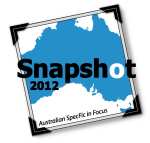
KYLA Ward is a Sydney-based creative who works in many modes. Her latest release is The Land of Bad Dreams, a collection of dark and fantastic poetry. Her novel Prismatic (co-authored as Edwina Grey) won an Aurealis Award for Best Horror. Her short fiction has appeared in Ticonderoga Online, Shadowed Realms, Borderlands, Gothic.net and in the Macabre anthology, amongst others. The next Cursebreaker story, ‘The Jikininki and the Japanese Jurist’, will shortly appear in The New Hero anthology from Stone Skin Press, who will also print her very first Mythos tale, ‘Who Looks Back?’ in Shotguns vs Cthulhu.
Her work on RPGs including Buffy the Vampire Slayer saw her appear as a guest at the inaugural Gencon Australia. She has had feature articles in magazines ranging from Dragon to Art Monthly Australia. Her short film, ‘Bad Reception’, screened at the Third International Vampire Film Festival and she is a member of the Theatre of Blood repertory company, which has also produced her work. In addition, she programmed the horror stream for the 2010 Worldcon. A practising occultist, she likes raptors, swordplay and the Hellfire Club. To see some very strange things, see her website at www.tabula-rasa.info.
Your first solo book is a collection of poetry — did you see that coming in your projections of a writing career, given how hard it is to get poetry published, let alone (one would think) macabre poetry?
No, it was a complete surprise! I attended the secondary launch of Leigh Blackmore’s Spores From Sharnoth at the Don Banks cottage and performed a few pieces in the open mic section. Danny Lovecraft of P’rea Press heard me and the entire idea was his. The faith was his and a serious part of the work. Poetry is a hard sell these days and I can’t pretend the book has been an overwhelming financial success, even though we recently made it onto Amazon. But I hope that the good reviews in Publishers Weekly amongst others, the Rhysling nominations and making the Stoker preliminary ballot go some way towards repaying him.
You write for the theatre and for role playing games as well as poetry: in what ways do these pursuits influence your fiction practice?
Undoubtedly it does. As a matter of fact, one of the things turned up by the process of editing The Land of Bad Dreams was that, all unknowing, I write poems specifically to be spoken aloud. Danny would point out errors in the metre and such that I couldn’t see, until we realised I was counting the points where I drew breath as syllables! Some pieces such as ‘Day Cars’ we ended up leaving in this weird hybrid form. But as I have said elsewhere: when I have an idea, it’s generally specific to a form. A script idea is a script, a poetry idea is a poem, a novel idea is a psychosis. It is extremely rare that I would translate one to another.
I think this is one reason poetry continues to be written, long after the days when people would fight each other at bookstores to secure the latest instalment of Byron’s ‘Don Juan’. Some ideas can only be expressed in poetry, and any attempt to do so tends towards poetry, whether this is acknowledged or not. Thus ‘prose poems’, dramatic monologues and a significant amount of flash fiction.
What advice do you have for writers who get the chills when it comes to reading their work out loud to an audience?
No, no, no: it’s the audience who are supposed to get the chills!
Being able to read your work in public is a great resource for a writer. They are the most difficult aspect of a work for the general public to ignore, or pirate. Readings can make a launch or signing into an event. Readings can be filmed and placed on YouTube. Plus, nothing displays the artistry of a piece, the flow of sentences and the aptness of words, like performance — assuming that the performer doesn’t freeze up and treat gripping prose like it’s a list of ingredients on a cereal box. The life is all there on the page, you simply have to release it out. Practice is the key: first getting used to the sound of your own voice and then learning how to control it. In my case, I can’t pretend that lengthy drama training didn’t help.
What Australian works have you loved recently?
Ben Peek’s ‘Below’ and Stephanie Campisi’s ‘Above’ <in Above/Below>. Clever, unusual and effective.
What have been some of the biggest changes in Australian speculative fiction in the past two years since Aussiecon 4?
Those associated with a slow recovery from near-total exhaustion? Or was that just me? E-books seems to have taken off in a big way. I am also looking forward to seeing what happens with GenreCon in Sydney this November: a brave experiment by any standards.
THIS interview was conducted as part of the 2012 Snapshot of Australian Speculative Fiction. We’re blogging interviews from 1-8 June and archiving them at Australian Speculative Fiction in Focus. You can read interviews at:


Pingback: Snapshots! Part Sixteen | Refracted Ambiguity with Polar Bear